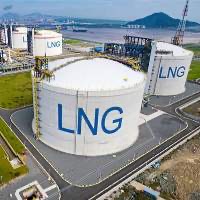The African upstream oil and gas sector is currently experiencing an $800 billion capital expenditure (capex). The organisation forecasts that liquefied natural gas (LNG) will be a significant investment theme in conjunction with conventional deepwater oil exploration.
Upstream Research Director at Wood Mackenzie, Ian Thom, spoke about this at the African Energy Week event in Cape Town. He stated that the 20-year investment cycle, which began in 2010, is expected to culminate at the end of the decade with world-scale LNG projects in Mozambique and floating LNG (FLNG) projects across five countries. Africa is currently a leader in FLNG, accounting for over 50 percent of global capacity, and there is potential for more projects to emerge.
In Nigeria, there are ongoing gas projects worth over $18 billion, including the Nigeria LNG Train Seven and a $5 billion FLNG project. However, concerns about feedstock gas amidst rising crude oil theft have been raised.
Thom stated: “With abundant gas resources, Africa is exploring all opportunities to develop gas for domestic and export markets. The niche role that FLNG plays has gained traction in Africa due to its flexibility, quick time to market, and suitability for smaller volumes. We foresee more examples where FLNG could be applied to African resources, and we expect further growth in this area.”
He added that current LNG exports from Africa are just over 40 million metric tonnes per annum (mmtpa), and several LNG projects in Sub-Saharan Africa (SSA) are at various stages of development. These include BP’s Tortue FLNG, located offshore from Senegal and Mauritania, which is expected to come on stream next year.
“Tortue Phase 1 is anticipated to come on stream next year, resulting in a short-term supply growth of 2.4 mmtpa. With easy access to European markets, deepwater gas in Senegal and Mauritania offers significant potential in what are relatively stable and supportive countries,” Thom explained.
He also highlighted several LNG and FLNG projects in Mozambique as crucial to the continent’s future LNG export aspirations. These include Coral Sul FLNG, which shipped its first cargo in November 2022, as well as Rovuma LNG and Mozambique LNG, both of which have stalled.
“Mozambique needs improved security to resume construction of onshore LNG facilities. Rovuma and Mozambique LNG are central to potentially doubling African LNG supply by 2035, but there is a risk that exports could flatline in the longer term if these projects fail to materialise,” Thom said.
Thom also mentioned that oil production in traditional hubs across Africa would struggle to offset declines at mature assets. Big oil players such as Nigeria, Angola, and Egypt, as a group, are expected to see oil production remain constant as we approach the end of the decade.
“With the global upstream trend firmly focused on advantaged resources, oil production will inevitably be affected by higher-cost and higher-emitting assets in Africa.
Thom stated that there might be potential for upside from reserve growth or undiscovered resources. He pointed to TotalEnergies’ recent discovery at Ntokon in Nigeria as a prime illustration of how new oil discoveries can fuel incremental growth. Additionally, he highlighted the exploration success in Namibia as evidence of how deepwater exploration can create robust investment prospects.

